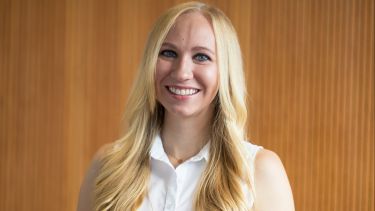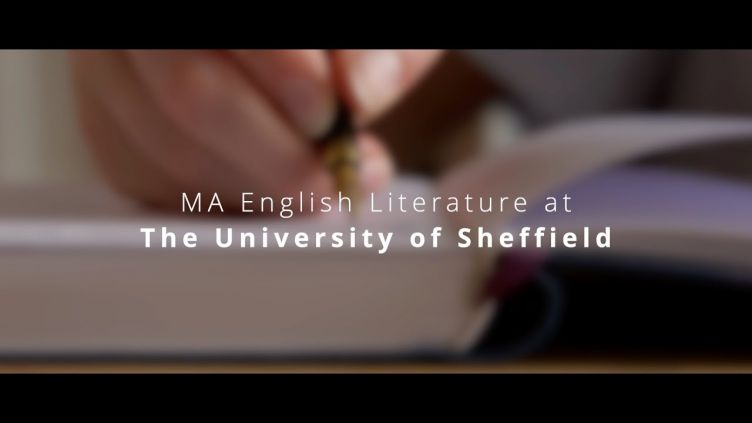English Literature MA
School of English,
Faculty of Arts and Humanities
-
Start date
September 2025 -
Duration
1 year 2 years -
Attendance
Full-time Part-time
Explore this course:
Book now for our online postgraduate open day on Wednesday 30 April 2025.

Course description
You can choose to focus your studies in a particular specialism - such as American literature, film, gothic studies and literary linguistics among others, or choose from any of the module to create a degree that best suits your interests.
Modules
Our wide range of modules will allow you to develop your knowledge across a range of fields including narrative, poetry, cinema and theatre from the 1400's right up to modern day.
Core Modules:
- Core Skills in Postgraduate Study
-
This module will help support you in making the transition to MA study. It is taught through a series of workshops on topics such as writing essays at MA level, finding and using secondary materials, giving presentations, and employability. Throughout, you'll be encouraged to reflect on your experiences and expectations, as well as receiving guidance from lecturers. Although the module is not formally assessed, and does not carry credits, it's taken by all students on the MA English Literature programme and as well as helping you to understand the skills you'll be using at MA level will include reflection on your learning and development.
Optional Modules may include
- Humans, Animals, Monsters and Machines: From Gulliver's Travels to King Kong
-
This module examines imaginings of the 'human' in relation to machines and animals (and those monsters that are neither one thing nor the other) from the eighteenth century to the twentieth. We will focus mainly on fiction, its cultural contexts and on readings from the period's key thinkers of human being, alongside more recent theories of humans, posthumans and animals. The aim is to encourage critical engagement with this key issue and to facilitate a deeper appreciation of the period's literature, culture and politics, including the relationship of discourses of technology and species to discourses of class, gender and race.
30 credits - Romantic Gothic
-
Romantic Gothic considers the various manifestations of the Gothic mode, from the middle of the eighteenth century towards the end of the Romantic period in 1830. Looking at how the Gothic became such an enduring and powerful mode of expression in literature, the module will look at Gothic poetry, Gothic novels, Gothic bluebooks, and accounts of supernatural occurrences in the popular magazines and newspapers of the age. By the end of the module, you will have a good knowledge of the rise of the Gothic during the eighteenth century and Romantic periods, and will have examined some of the most popular Gothic works of the age alongside less canonical works.
30 credits - Shakespearean Transformations
-
This module approaches the literature of Shakespeare's era through the theme of transformation. This theme has multiple dimensions: first, you'll look at how Shakespeare and other Renaissance writers transformed existing literary traditions such as the classical epic, religious scripture, and medieval romance within their own writing. Then, you'll look at examples of transformation in Renaissance writing, such as changing sex, changing religion, and changes between the human and the animal. The module also reflects self-consciously on Shakespeare/Renaissance studies as a discipline and how it has been transformed - and might be transformed in future - in light of changing critical, ethical and social priorities. The module is diverse in its content, covering drama, poetry and prose, reflecting the different specialisms and expertise of staff members. The form of assessment, critical essay, helps you to hone your writing skills at graduate level and to carry out independent research into your chosen topic.
30 credits - Contemporary Cinemas
-
This module encourages you to engage with recent developments in world cinema, and to research and interpret films, filmmakers and movements in contemporary film. You will study examples of contemporary international cinema which are currently being researched by academic staff, and be introduced to key critical and theoretical concepts which can be applied to the analysis of film. The films included for study will be actively chosen to reframe national, aesthetic and cultural debates and to foreground the empowerment and relevance of cultural production. As well as being able to view, appraise and discuss diverse and relevant examples of twenty-first century filmmaking, you will be encouraged to select, analyse and critically evaluate films of your choice, using the module's texts, ideas, approaches and debates as points of departure for your own cinematic research. You will gain and develop skills in close analysis, the application of theory, contextual reading, and researching and writing on important, influential and challenging film texts.
30 credits - American Nightmares: Socio-political Discourses in American Gothic Literature
-
Have you been struck by how often American socio-political discourse sound like Gothic fictions? The Gothic is a pervasive mode in America, one which expresses and negotiates a variety of social anxieties such as racial identity, patriarchy and the rise of feminism, and class antagonism. This course will examine a variety of Gothic texts from the 1800s onward to explore how they express and negotiate various socio-political anxieties and shifts. We will also contextualize the narratives by reviewing the relevant socio-political ideologies and debates contemporary to the texts. In doing so, the course will clarify the numerous chasms between the American ideal and the brutal American reality.
30 credits - The Sacred and the Sexual: Gender, Sex, and the Bible
-
There has been no piece of literature more influential on Western and colonial understandings of sex, gender, and sexuality than the Bible. This module will teach you how to read the biblical text closely and to engage with theorists whose approaches to the Bible yield new understandings of this ancient text. Topics include masculinity, femininity, queer and trans identities, sexual pleasure, and gender-based violence. As we explore these topics together, you'll have the opportunity to focus on a particular area of interest and develop your own research. It is not expected that you have deep or broad familiarity with the biblical text before taking the module; only that you are able to perform close analytical readings.
30 credits - Post-1945 British Drama, Film and Television
-
This module provides the opportunity for in-depth study of British theatre, film and television in the period after the end of World War II. This fascinating era saw the emergence of new subjects for plays, films and television. These influential art forms embraced new approaches such as social realism to portray key contemporary issues of race, gender equality, regional identity, economic change, and political conflict. You will study and discuss diverse texts drawn from theatre, cinema and television drama which illustrate the profound cultural changes taking place in Britain after 1945. Analysing examples drawn from trends and styles such as the social problem film, New Wave cinema, 'kitchen sink' drama, war film, Hammer horror, Ealing comedy and television docu-drama will acquaint you with the terminology and contextual knowledge for understanding theatre, film and television of the period, apply critical and theoretical models to interpret them, and equip you with intellectual and communication skills to develop, express and defend your views.
30 credits - Confession
-
'Western man has become a confessing animal,' or so Michel Foucault contended. This module interrogates confessional acts in literature and culture across a wide historical span. (In previous years, we have reached back to St. Augustine's Confessions from the 4th century CE, right up to Hannah Gadsby's 2020 Netflix special, Douglas.) We focus in particular on the nineteenth and twentieth centuries, exploring confession and related forms (including analysis, testimony and witness) across diverse contexts: sacred and secular law; medicine and addiction; enslavement and war; sex, scandal and sensation; neurodiversity. Writers studied in previous years have included: Thomas De Quincey, Mary Seacole, Oscar Wilde, Sigmund Freud, Vita Sackville-West and Black Elk.
30 credits - Memory and Trauma in Contemporary Literature
-
This module examines a variety of representations of memory and trauma in contemporary narrative. The texts range widely both generically (from memoir to fiction and the graphic novel) and thematically (to include both personal and collective histories, memories and traumas). Texts by Julian Barnes, Annie Ernaux, Kazuo Ishiguro, Herta Muller or Yoko Ogawa will be studied in relation to classic, contemporary and decolonial theories of memory and trauma, such as those of Sigmund Freud, Cathy Caruth, Stef Craps and Michael Rothberg. We will discuss how narrative form is affected by such factors as historical events, memory loss, delayed recovery and childhood recall. You will gain and develop skills in close analysis, the application of theory, contextual reading, and researching and writing on important, influential and challenging texts.
30 credits - Mid-Century Modernism
-
The module will engage with current research and scholarship relating to literature of the 'long modern' period (1930 to 1975), introducing you to the history and contemporary state of criticism and theory in relation to mid twentieth-century cultural production. You will receive a thorough grounding in research methods specific to the period. This is a period of unprecedented violence and transformation, from the momentous impact of totalitarian systems, the rise and impact of the Second World War on global culture, host to the worst events the world has ever experienced with the Holocaust and Bomb, the age of rapid and shifting groups and movements, existentialism through abstract expressionism to confessional, innovative and pop art styles. It is also an era of very deep reflection on the idea of the relations between systems of thought across disciplines. The module will chart that reflection as well as a forum for thinking about art's power in a world under new techno-political compulsions, be they nuclear-apocalyptic, Cold War-propagandized, or transnational, neo-imperial, superpowered or postcolonial.
30 credits - Literature and Language in the Workplace
-
This module will give you the opportunity to work with an external organisation, applying your research and communication skills to a specific project. You will undertake 100 hours of work with an external partner on an agreed project. At the end of the project you complete a log and record of your activities, and write a reflective essay.
15 credits
The module will help you develop research skills such as working with archives, museums, and oral histories, and using social media. It will also give you experience of engaging members of the public with academic research. It will enable you to undertake valuable work experience and develop your CV. - Murderers and Degenerates: Contextualising the fin de siècle Gothic
-
The module explores three related case histories which help to establish how the literary Gothic shaped particular fin de siècle anxieties. To that end the module examines accounts of Joseph Merrick (aka The Elephant Man), newspaper reports of the Whitechapel murders of 1888, and the trials of Oscar Wilde. It is by exploring how the Gothic infiltrated medical, criminological, and legal discourses that we can see how a narrative which centred on the pathologisation of masculinity was elaborated at the time. These case histories will be read alongside Jekyll and Hyde (1886), The Great God Pan (1894) and Dracula (1897) as three of the key literary texts which also examine medicine, the law, and crucially the urban and gender contexts which in turn shape the three case histories.
30 credits - Work Placement with Research Project
-
This module provides you with the experience of working with an external organisation (for example, a library, gallery, theatre, school) and undertaking a short research project related to that organisation. You will choose a placement from those offered at the start of the academic year and will work on a defined project agreed between the academic co-ordinator and the partner institution. Alongside this project, you will undertake a programme of related reading and research directed by the academic co-ordinator. The module has three aims: (1) to enable you to develop your discipline-specific vocational skills (2) to enable you to gain practical research skills through undertaking research related to your project (3) to promote reflection on the relationship between academic research and external organisations.
30 credits - Dissertation (English Literature)
-
The Dissertation is an independent research essay equivalent to around 12,000 words on a topic chosen by you, relating to your programme of study on either the MA in English Literature, MA in Creative Writing or the MA English Studies. It will be supervised by a member of staff with an academic interest in the topic, and you will meet your supervisor approximately three times. The dissertation should present an argument that develops over a series of chapters/sections. It should demonstrate an ability to carry out effective research using appropriate methods of enquiry, as well as expertise in writing and the communication of research discoveries, and in organisation.
60 credits
The content of our courses is reviewed annually to make sure it's up-to-date and relevant. Individual modules are occasionally updated or withdrawn. This is in response to discoveries through our world-leading research; funding changes; professional accreditation requirements; student or employer feedback; outcomes of reviews; and variations in staff or student numbers. In the event of any change we will inform students and take reasonable steps to minimise disruption.
Duration
- 1 year full-time
- 2 years part-time
Teaching
Teaching is through seminars.
Assessment
You’ll be assessed on your essays, coursework and a 12,000-word dissertation.
Your career
School
School of English
We're a research-intensive school with an international perspective on English studies. Students can specialise in their chosen subject, while taking modules from other programmes, forging interdisciplinary connections. We encourage you to get involved and to apply your academic learning, working in partnership with external organisations both within the city of Sheffield and beyond.
Our staff are researchers, critics, and writers. They're also passionate, dedicated teachers who work tirelessly to ensure their students are inspired.
We keep seminar groups small because we believe that's the best way to stimulate discussion and debate. Our modules use a range of innovative assessments and can include designing websites, writing blog posts, and working with publishing software, in addition to writing essays and delivering presentations.
We're committed to providing you with the pastoral support you need in order to thrive on your degree. You'll be assigned a personal tutor with whom you'll have regular meetings. You're welcome to see any of our academic staff in their regular student consultations if there's anything you want to ask.
Facilities
Student profiles

СŷĘÓƵ stood out for me because of its wonderful English programme and facilities for students. Being a postgraduate in the department has been a challenging and fantastic learning experience
Entry requirements
Minimum 2:1 undergraduate honours degree in a relevant subject.
Subject requirements
We accept degrees in the following subject areas:
- English Language
- English Literature
- History
- Linguistics
- Modern Languages
- Philosophy
Your degree should be in an Arts and Humanities or Social Sciences subject.
View an indicative list of degree titles we would consider
English language requirements
IELTS 7.5 (with 7 in each component) or СŷĘÓƵ equivalent
If you have any questions about entry requirements, please contact the school/department.
Fees and funding
Fees
Alumni discount
Save up to ÂŁ2,500 on your course fees
Are you a Sheffield graduate? You could save up to ÂŁ2,500 on your postgraduate taught course fees, subject to eligibility.
Apply
You can apply now using our Postgraduate Online Application Form. It's a quick and easy process.
Contact
Any supervisors and research areas listed are indicative and may change before the start of the course.
Recognition of professional qualifications: from 1 January 2021, in order to have any UK professional qualifications recognised for work in an EU country across a number of regulated and other professions you need to apply to the host country for recognition. Read and the .

